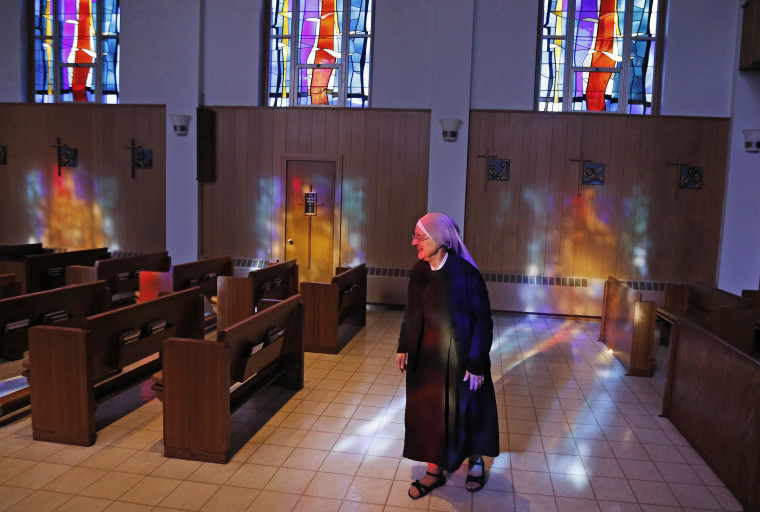A group of Colorado nuns has no reason to appeal the birth control mandate in the health care law because it doesn't have to provide contraception anyway, the U.S. government argued on Friday.
But the Little Sisters of the Poor say they cannot authorize someone else to "sin on their behalf".
It’s an early skirmish in a year expected to be full of battles over the so-called contraceptive mandate in the Obamacare law.
The administration says the group is already exempt from the law, because their insurance is provided by Christian Brothers Services. As a church organization, it’s excused from the law’s requirements. The nuns have said they don't want to sign a waiver asking for an exemption.
"With the stroke of their own pen, applicants can secure for themselves the relief they seek from this Court," the Department of Justice wrote in its response. "They need only self-certify that they are non-profit organizations that hold themselves out as religious and have religious objections to providing coverage for contraceptive services."
"The idea that it’s just a stroke of the pen trivializes the matter," countered Eric Rassbach, deputy general counsel for the Becket Fund for Religious Liberty, which represents the Little Sisters.
"You don’t have to actually do it to be liable. If you are directing someone else to do the act that is immoral, you yourself are immoral," Rassbach told reporters in a telephone briefing.
And the group made the same argument in its response to the government's response later on Friday: "The Little Sisters and other Applicants cannot execute the form because they cannot deputize a third party to sin on their behalf," it reads.
Becket asked the Supreme Court to keep the injunction in place. "The temporary injunction issued Tuesday night saved Mother Provincial Loraine Marie Maguire from the choice of violating her faith by executing the government’s required form, or exposing the Little Sisters’ ministry to decimation by IRS penalties," its response reads. "She exercised her religion that night, and each day since, by acting in accordance with God’s will as she understands it. The temporary injunction protected, and continues to protect, that religious exercise."
All new insurance plans, including those provided by employers, must provide free birth control as part of a list of essential benefits, including vaccinations and cancer screenings.
When some religious groups objected, the Obama administration provided exemptions. And an older law, the 1974 Employee Retirement Income Security Act, exempts church plans from regulation anyway.
The Denver chapter of the Little Sisters of the Poor says it cannot even sign a waiver asking for an exemption. Supreme Court justice Sonia Sotomayor, who has responsibility for the 10th Circuit Court of Appeals where the group filed its latest appeal, granted a last-minute injunction on New Year’s Eve.
“The question here is in order to receive that exemption, they have to fill out a form,” says Ian Millhiser, senior constitutional policy analyst at the Center For American Progress. “That form announces to the government that they have a religious exemption. Employees can use that form to get (birth control) from their insurer.”
But no one who works for Little Sisters can get birth control under their plan, anyway, the DoJ argues. "Given these circumstances, applicants' concern that they are 'authorizing others' to provide coverage lacks any foundation in the facts or the law," the DoJ said in its filing to the Supreme Court.
The Becket Fund is the same law firm helping Hobby Lobby, other for-profit businesses and some colleges and universities that are also challenging the contraceptive mandate.
The Little Sisters case is separate from these cases, in which the owners object to birth control and argue they shouldn’t have to provide it. The Supreme Court will hear arguments on Hobby Lobby's case in March. More than 100 suits have been filed against the mandate.
Right now, the Supreme Court’s involvement in the Little Sisters case is minimal. Sotomayor can send it back to the federal courts or she can ask her colleagues to consider it as a full court.
It's all a bit of a sideshow anyway, argues Cecile Richards, president of the Planned Parenthood Federation of America. "Today, 27 million women have access to birth control without a co-pay under the Affordable Care Act, and that’s not affected by the Supreme Court reviewing the administrative mechanism that religious groups can use to opt out of covering birth control," Richards said in a statement.
“This spring, a bigger question faces the Court, which could affect millions of people: whether women’s bosses at for-profit companies can decide to deny them access to birth control. This bigger question has a very real impact on millions of women’s lives."
Brigitte Amiri of the American Civil Liberties Union, which supports the mandate, says she is not concerned by Sotomayor’s action.
“Justice Sotomayor wants to make a thoughtful decision,” she told NBC News. “I think this temporary holding pattern isn’t a cause for concern at this point. It allows for all briefs to be filled out.”
“It was like, ‘let’s take a deep breath’,” agreed Judy Waxman of the National Women’s Law Center.
Archbishop Joseph Kurtz of Louisville, president of the U.S. Conference of Catholic Bishops, notes that the White House has extended more than a few deadlines for people trying to buy health insurance on the troubled exchanges. “I understand that legal issues in these cases will ultimately be settled by the Supreme Court,” Kurtz wrote in a letter to Obama.
“In the meantime, however, many religious employers have not obtained the temporary relief they need in time to avoid being subjected to the HHS mandate beginning January 1. I urge you, therefore, to consider offering temporary relief from this mandate, as you have for so many other individuals and groups facing other requirements under the ACA.”
